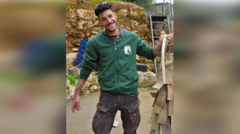A recent attack in Boulder highlights the growing fears of antisemitism within Jewish communities in the U.S. The violent incident, resulting in multiple injuries, followed a series of attacks against Jewish individuals and institutions, prompting discussions about safety and security measures.
Boulder Attack Heightens Concerns Over Antisemitism in U.S. Jewish Communities

Boulder Attack Heightens Concerns Over Antisemitism in U.S. Jewish Communities
Following a violent incident in Boulder, Colorado, tensions within the U.S. Jewish community rise as fears of escalating antisemitism are ignited.
The attack on a group raising awareness for hostages held in Gaza occurred on Sunday in Boulder, Colorado, injuring 12 people. Mohammed Sabry Soliman, the alleged assailant, is accused of launching incendiary devices at the gathering and reportedly expressed intentions to "kill all Zionist people." This incident is part of a broader pattern of antisemitic attacks, leaving many in North America’s Jewish community anxious about rising hostility.
Just weeks prior to the Boulder incident, a fatal shooting targeted a couple associated with the Israeli embassy in Washington, D.C., while they attended an event at the Capitol Jewish Museum. Moreover, the official residence of Pennsylvania's governor, Josh Shapiro, was ignited in flames shortly after the Jewish lawmaker celebrated Passover, further intensifying apprehensions.
Adina Vogel Ayalon of J Street, a pro-Israel advocacy group, remarked that fears among Jewish Americans have escalated, emphasizing that these hate crimes disregard individual political affiliations regarding the ongoing conflict between Israel and Hamas. The violence is symptomatic of heightened tensions exacerbated by the international scrutiny of Israel’s military actions in Gaza following a deadly Hamas attack on October 7 that claimed approximately 1,200 lives, predominantly civilians.
The ongoing war has led to over 50,000 reported fatalities in Gaza, as cited by the Hamas-run health ministry, with human rights organizations condemning the worsening humanitarian crisis. As protests supporting Palestinian rights sweep through American cities and campuses, the divisive political climate deepens within the Jewish community itself regarding support for Israel and diplomatic solutions.
In light of the Boulder attack, several organizations, including the Muslim Public Affairs Council, condemned the violence as an affront to societal norms of pluralism and safety for all, reinforcing the need for solidarity against acts of hatred. The targeted group, Run For Their Lives, aims to peacefully advocate for the release of hostages and has not engaged in partisan protests, gathering support from diverse backgrounds.
Historically, Jewish communities have prioritized security measures, especially following the 2018 Pittsburgh synagogue shooting. The recent succession of violent events has prompted renewed dialogues about safety and security for Jewish Americans, making many ponder the severe implications of such attacks. Haliey Soifer, CEO of the Jewish Democratic Council, noted that the Boulder and D.C. incidents have instilled a pervasive fear that such attacks could happen anywhere.
Following the Boulder attack, local Jewish organizations initiated a fundraiser to boost community security and provide aid to attack victims, aiming for $160,000 in support. Community leaders fear that incidents like this may lead to increased radicalization and repeat occurrences of violence, as Rabbi Dan Moskovitz expressed concern about the potential for further attacks stemming from the growing animosity.
Just weeks prior to the Boulder incident, a fatal shooting targeted a couple associated with the Israeli embassy in Washington, D.C., while they attended an event at the Capitol Jewish Museum. Moreover, the official residence of Pennsylvania's governor, Josh Shapiro, was ignited in flames shortly after the Jewish lawmaker celebrated Passover, further intensifying apprehensions.
Adina Vogel Ayalon of J Street, a pro-Israel advocacy group, remarked that fears among Jewish Americans have escalated, emphasizing that these hate crimes disregard individual political affiliations regarding the ongoing conflict between Israel and Hamas. The violence is symptomatic of heightened tensions exacerbated by the international scrutiny of Israel’s military actions in Gaza following a deadly Hamas attack on October 7 that claimed approximately 1,200 lives, predominantly civilians.
The ongoing war has led to over 50,000 reported fatalities in Gaza, as cited by the Hamas-run health ministry, with human rights organizations condemning the worsening humanitarian crisis. As protests supporting Palestinian rights sweep through American cities and campuses, the divisive political climate deepens within the Jewish community itself regarding support for Israel and diplomatic solutions.
In light of the Boulder attack, several organizations, including the Muslim Public Affairs Council, condemned the violence as an affront to societal norms of pluralism and safety for all, reinforcing the need for solidarity against acts of hatred. The targeted group, Run For Their Lives, aims to peacefully advocate for the release of hostages and has not engaged in partisan protests, gathering support from diverse backgrounds.
Historically, Jewish communities have prioritized security measures, especially following the 2018 Pittsburgh synagogue shooting. The recent succession of violent events has prompted renewed dialogues about safety and security for Jewish Americans, making many ponder the severe implications of such attacks. Haliey Soifer, CEO of the Jewish Democratic Council, noted that the Boulder and D.C. incidents have instilled a pervasive fear that such attacks could happen anywhere.
Following the Boulder attack, local Jewish organizations initiated a fundraiser to boost community security and provide aid to attack victims, aiming for $160,000 in support. Community leaders fear that incidents like this may lead to increased radicalization and repeat occurrences of violence, as Rabbi Dan Moskovitz expressed concern about the potential for further attacks stemming from the growing animosity.


















